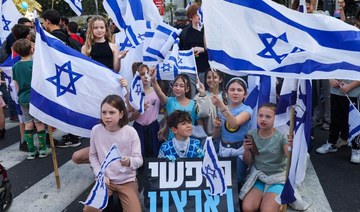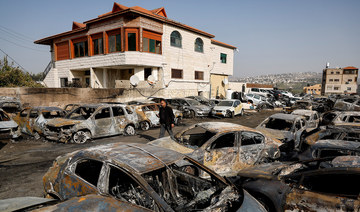TEL AVIV: Weeks of anti-government protests in Israel turned violent on Wednesday for the first time as police fired stun grenades and a water cannon at demonstrators who blocked a Tel Aviv highway. The crackdown came shortly after Israel’s hard-line national security minister urged a tough response to what he said were “anarchists.”
The violence came as thousands across the country launched a “national disruption day” against the government’s plan to overhaul Israel’s judicial system.
Prime Minister Benjamin Netanyahu’s allies say the program is meant to reduce the influence of unelected judges. But critics, including influential business leaders and former military figures, say Netanyahu is pushing the country toward authoritarian rule and has a clear conflict of interest in targeting judges as he stands trial on corruption charges.
Since Netanyahu’s government took office two months ago, tens of thousands of people have taken to the streets to protest the changes, which they say endangers Israel’s fragile system of checks and balances. Wednesday, however, marked the first time police used force against the crowds.
The government is barreling ahead with the legal changes and a parliamentary committee is moving forward on a bill that would weaken the Supreme Court.
The crisis has sent shock waves through Israel and presented Netanyahu with a serious challenge. A wave of Israeli-Palestinian violence in the occupied West Bank has compounded his troubles.
The rival sides are digging in, deepening one of Israel’s worst domestic crises. Netanyahu and his government, made up of ultranationalists, have branded the protesters anarchists, while stopping short of condemning a West Bank settler mob that torched a Palestinian town earlier this week.
The legal overhaul has sparked an unprecedented uproar, with weeks of mass protests, criticism from legal experts and rare demonstrations by army reservists who have pledged to disobey orders under what they say will be a dictatorship after the overhaul passes. Business leaders, the country’s booming tech sector and leading economists have warned of economic turmoil under the judicial changes. Israel’s international allies have expressed concern.
In the first scenes of unrest since the protests began two months ago, police arrived on horseback in the center of the seaside metropolis of Tel Aviv, hurled stun grenades and used a water cannon against thousands of protesters who chanted “democracy” and “police state.” A video posted on social media showed a police officer pinning down a protester with his knee on the man’s neck and another showed a man who reportedly had his ear ripped off by a stun grenade.
Facing the police, protesters also chanted “where were you,” a reference to the absence of security forces during the settler attack on the Palestinian town of Hawara, which took hours to quell and which the military said it was not prepared for.
Police said protesters threw rocks and water bottles at the officers. Police said they arrested 39 protesters in Tel Aviv for disturbing the peace while 11 people were hospitalized with various injuries, according to Tel Aviv Sourasky Medical Center. Earlier Wednesday, protesters blocked Tel Aviv’s main freeway and the highway connecting the city to Jerusalem, halting rush hour traffic for about an hour. At busy train stations in Tel Aviv, protesters prevented trains from departing by blocking their doors.
National Security Minister Itamar Ben-Gvir, an ultranationalist accused of politicizing the police, has vowed to take a tough line. He called on police to prevent the road blockages, labeling the demonstrators “anarchists.”
Netanyahu said Ben-Gvir had his full support. “We will not tolerate violence against police, blocking roads and blatant breaches of the country’s laws. The right to protest is not the right to anarchy,” he said.
Netanyahu also blamed opposition leader Yair Lapid for fomenting anarchy. Lapid called on police to show restraint and said Netanyahu’s government had lost control.
“The protesters are patriots,” Lapid tweeted. “They are fighting for the values of freedom, justice and democracy. The role of the police is to allow them to express their opinions and fight for the country they love.”
Thousands of protesters came out in locations across the country waving Israeli flags. Parents marched with their children, tech workers walked out of work to demonstrate and doctors in scrubs protested outside hospitals. The main rallies were expected later Wednesday outside the Knesset, or parliament, and near Netanyahu’s official residence in Jerusalem.
“Every person here is trying to keep Israel a democracy and if the current government will get its way, then we are afraid we will no longer be a democracy or a free country,” said Arianna Shapira, a protester in Tel Aviv. “As a woman, as a mother, I’m very scared for my family and for my friends.”
Justice Minister Yariv Levin, the overhaul’s main architect, said Tuesday that the coalition aims to ram through some of the judicial overhaul bills into law in the coming month, before the parliament goes on recess for the Passover holiday on April 2.
The Knesset also is set to cast a preliminary vote Wednesday on a separate proposal to protect Netanyahu from being removed from his post, a move that comes following calls to the country’s attorney general to declare him “unfit for office.”
Netanyahu has been the center of a years-long political crisis in Israel, with former allies turning on him and refusing to sit with him in government because of his corruption charges. That political turmoil, with five elections in four years, culminated in Netanyahu returning to power late last year, with ultranationalist and ultra-Orthodox parties as partners in the current far-right government.
Wielding immense political power, those allies secured top portfolios in Netanyahu’s government, among them Ben-Gvir, who before entering politics was arrested dozens of times and was once convicted of incitement to violence and support for a terror group. Finance Minister Bezalel Smotrich, a firebrand West Bank settler leader, has been given authority over parts of the territory.
They have promised to take a tough stance against Palestinians, which has ratcheted up tensions in recent weeks. Smotrich publicly called for a harsh response to the killing of two Israelis in the West Bank by a Palestinian gunman, saying Israel should “go crazy,” shortly before Sunday’s mob violence. While he later urged restraint, he also said Wednesday that Hawara, the Palestinian town that was attacked, should be “erased.”
In addition to the protests, Netanyahu’s government, Israel’s most right-wing ever, is beginning to show early cracks, just two months into its tenure.
The government says the legal changes are meant to correct an imbalance that has given the courts too much power and allowed them to meddle in the legislative process. They say the overhaul will streamline governance and say elections last year, which returned Netanyahu to power with a slim majority in parliament, gave them a mandate to make the changes.
Critics say the overhaul will upend Israel’s system of checks and balances, granting the prime minister and the government unrestrained power and push the country toward authoritarianism.
Israeli police crack down, clash with anti-Netanyahu protest
https://arab.news/2t8tj
Israeli police crack down, clash with anti-Netanyahu protest
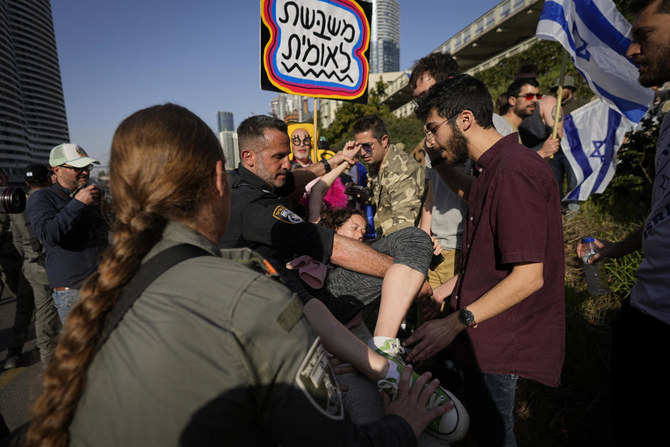
- Israel’s hard-line national security minister urged a tough response to what he said were “anarchists"
Sudan facing ‘inferno’ of violence, crushing aid holdups: UN

- The grim situation is only expected to worsen
United Nations, US: Residents of conflict-hit Sudan are “trapped in an inferno of brutal violence” and increasingly at risk of famine due to the rainy season and blocked aid, the UN’s humanitarian coordinator for the country warned Wednesday.
Tens of thousands of people have died and millions have been displaced since war broke out in April 2023 between the army and the paramilitary Rapid Support Forces (RSF).
“Famine is closing in. Diseases are closing in. The fighting is closing in and there’s no end in sight,” Clementine Nkweta-Salami told a press conference.
The grim situation is only expected to worsen, with “just six weeks before the lean season sets in, when food becomes less available, and more expensive.”
Noting that more than four million people are facing potential famine, Nkweta-Salami added that the onset of the country’s rainy season means that “reaching people in need becomes even more difficult.”
The area’s planting season also “could fail if we aren’t able to procure and deliver seeds for farmers,” she said.
And “after more than a year of conflict, the people of Sudan are trapped in an inferno of brutal violence.”
“In short, the people of Sudan are in the path of a perfect storm that is growing more lethal by the day,” Nkweta-Salami warned, adding that the humanitarian community needs “unfettered access to reach people in need, wherever they are.”
The United Nations has expressed growing concern in recent days over reports of heavy fighting in densely populated areas as the RSF seeks control of El-Fasher, the last major city in the western Darfur region not under its control.
“Right now the humanitarian assistance they rely on can’t get through,” Nkweta-Salami said.
More than a dozen UN trucks loaded with medical equipment and food, which left Port Sudan on April 3, have still not reached El Fasher, she said, “due to insecurity and delays in getting clearances at checkpoints.”
Israel PM says no humanitarian crisis as hundreds of thousands flee Rafah

RAFAH, Palestinian Territories: Israeli Prime Minister Benjamin Netanyahu on Wednesday insisted there was no “humanitarian catastrophe” in Rafah, even as hundreds of thousands fled the south Gaza city amid intense fighting.
Hamas meanwhile insisted it would take part in any decision on the post-war government of Gaza as Palestinians marked the 76th anniversary of the “Nakba,” when around 760,000 Palestinians fled or were driven from their homes during the 1948 creation of Israel.
Israeli forces have bombed Hamas militants around Gaza’s far-southern city of Rafah, but clashes have also flared again in northern and central areas which Israeli troops first entered months ago.
The upsurge in urban combat has fueled US warnings that Israel, which launched its war after the October 7 Hamas attacks, risks being bogged down in years of counterinsurgency.
But despite previous threats by US President Joe Biden to withhold some arms deliveries over Netanyahu’s insistence on attacking Rafah, his administration informed Congress on Tuesday of a new $1 billion weapons package for Israel, official sources told AFP.
The European Union urged Israel to end its military operation in Rafah “immediately,” warning failure to do so would “inevitably put a heavy strain” on ties with the bloc.
But even as he announced that hundreds of thousands had been “evacuated,” Netanyahu insisted there was no humanitarian crisis in Rafah.
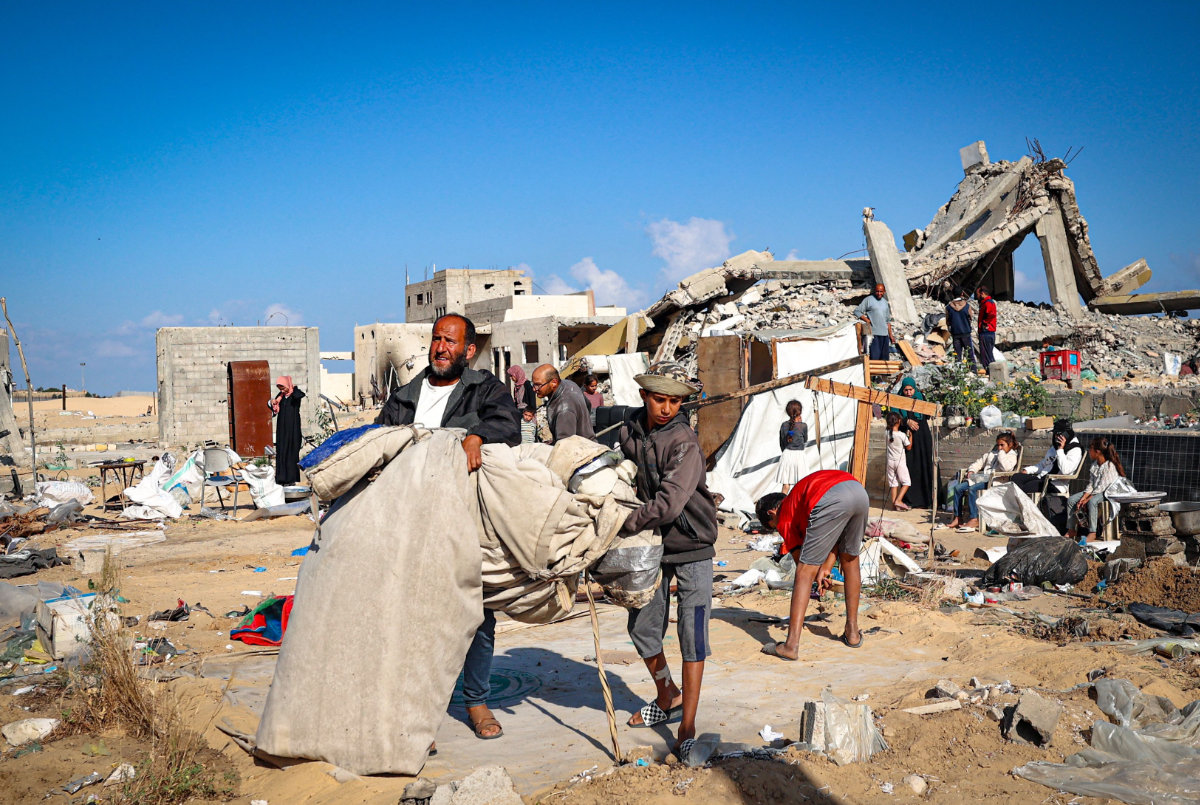
“Our responsible efforts are bearing fruit. So far, in Rafah, close to half a million people have been evacuated from the combat zones. The humanitarian catastrophe that was spoken about did not materialize, nor will it,” he said.
The United Nations agency for Palestinian refugees, UNWRA, meanwhile said “600K people have fled Rafah since military operations intensified.”
Nakba Day
The sight of desperate families carrying scant belongings through the ruins of war-scarred Gaza cities has evoked for many the events of the 1948 Nakba which translates from Arabic as “catastrophe.”
Hamas declared in a Nakba Day statement that “the ongoing suffering of millions of refugees inside Palestine and in the diaspora is directly attributed to the Zionist occupation.”
Hamas chief Ismail Haniyeh insisted meanwhile that the militant movement will be involved in deciding post-war rule in Gaza along with other Palestinian factions.
“We say that the Hamas movement is here to stay ... and it will be the movement and all national (Palestinian) factions who will decide the post-war rule in Gaza,” Haniyeh said in a televised address for Nakba.
He also said the fate of truce talks was uncertain because of Israel’s “insistence on occupying the Rafah crossing and on its expansion of the aggression” in the Palestinian territory.
“Any agreement must ensure a permanent ceasefire, comprehensive withdrawal (of Israeli forces) from all sectors of the Gaza Strip, a real deal for exchange of prisoners, the return of displaced persons, reconstruction and lifting the siege” of Gaza, Haniyeh said.
Thousands marched to mark the day in cities across the Israeli-occupied West Bank, waving Palestinian flags, wearing keffiyeh scarves and holding up symbolic keys as reminders of long-lost family homes.
Netanyahu has vowed to destroy Hamas and bring home hostages still held in Gaza.
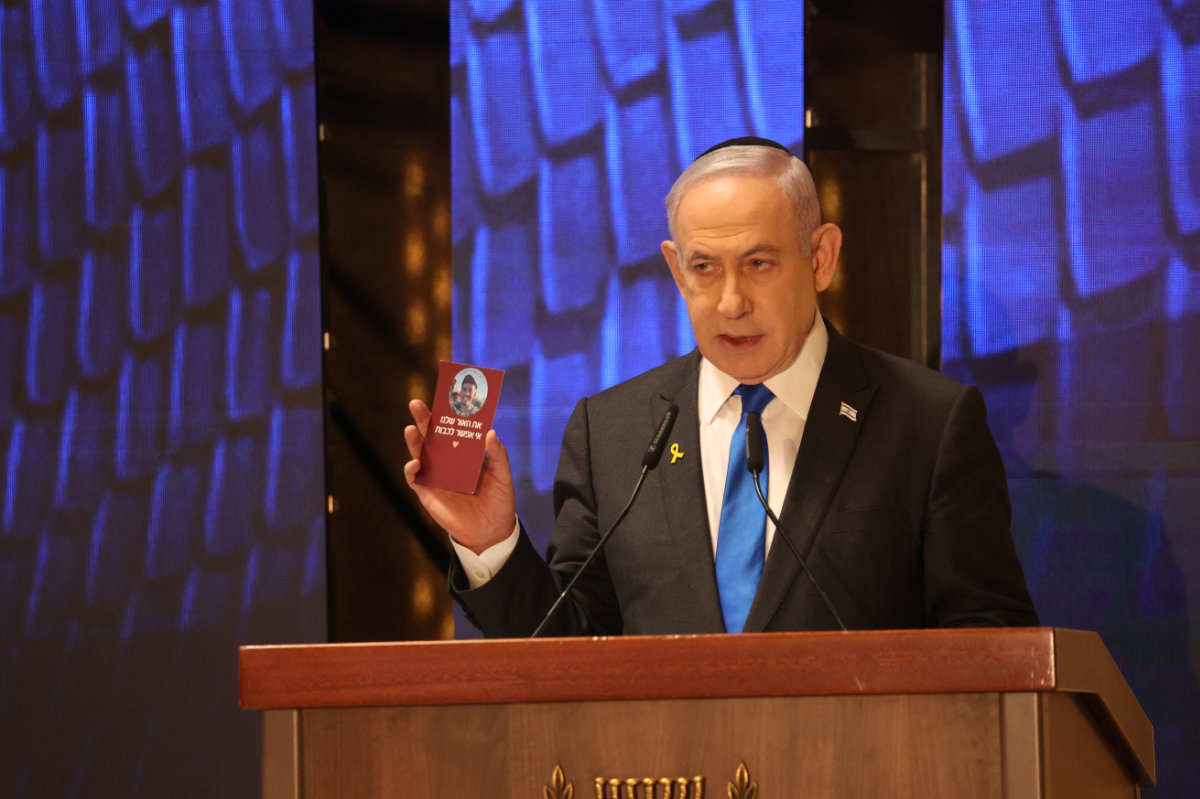
The United Nations agency for Palestinian refugees, UNWRA, meanwhile said “600K people have fled Rafah since military operations intensified.”
In a Wednesday interview with CNBC, Netanyahu addressed the tensions with Biden over the offensive, saying: “Yes, we do have a disagreement on Gaza. Rather, on Rafah. But we have to do what we have to do.”
Washington has also repeatedly urged Israel to work on a post-war plan for Gaza and supports the goal of a two-state solution, which Netanyahu and his far-right allies strongly oppose.
US State Department spokesman Vedant Patel said without a political plan, Palestinian militants “will keep coming back” trapping all sides in “this continued cycle of violence.”
Israeli Defense Minister Yoav Gallant on Wednesday said he would “not agree to the establishment of an Israeli military administration in Gaza, Israel must not have civilian control over the Gaza Strip.”
The war broke out after Hamas’s October 7 attack on southern Israel which resulted in the deaths of more than 1,170 people, mostly civilians, according to an AFP tally of Israeli official figures.
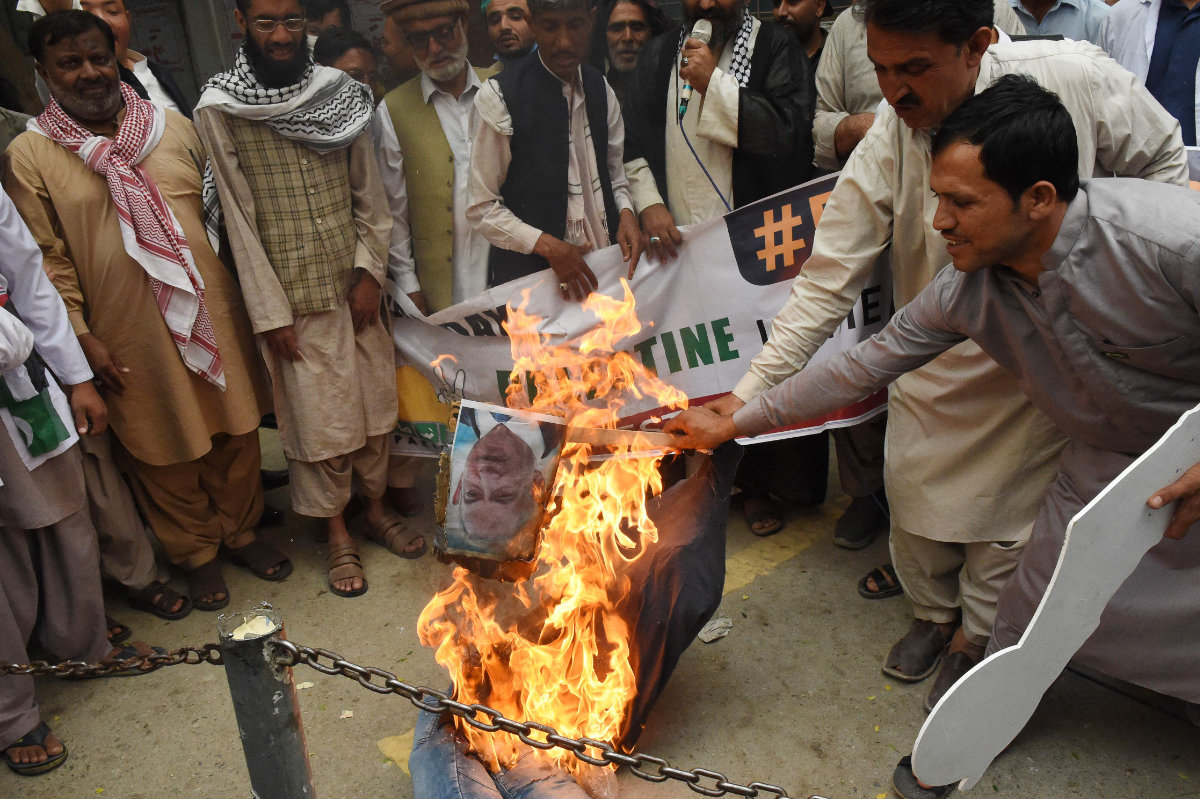
The militants also seized about 250 hostages, 128 of whom Israel estimates remain in Gaza, including 36 the military says are dead.
Israel’s military retaliation has killed at least 35,233 people, mostly civilians, according to the Gaza health ministry, and an Israeli siege has brought dire food shortages and the threat of famine.
Clashes continue
The Israeli military said Wednesday its aircraft had “struck and eliminated approximately 80 terror targets” including military compounds, missile launchers and weapons depots.
It also reported battles in eastern Rafah and in Jabalia in northern Gaza, where it said it had killed militants, adding troops were also fighting in the Zeitun area.
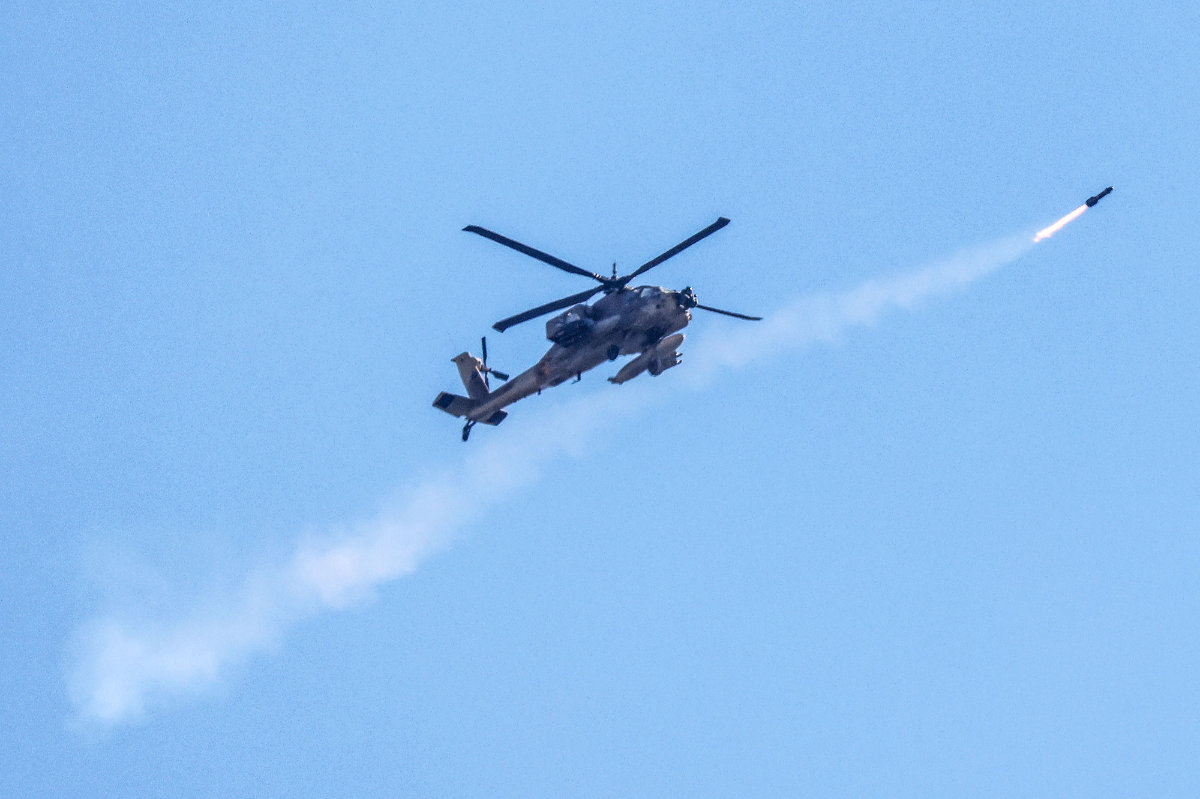
Hamas’s armed wing also reported its fighters were clashing with troops in the Jabalia area, much of which has been reduced to rubble.
At least five people were killed, including a woman and her child, in two Israeli air strikes on Gaza City overnight, Gaza’s civil defense agency said.
At the city’s Al-Ahli hospital, a wounded man, his bare chest smeared with blood, lay on a cot while outside several men placed a shrouded corpse in the shade of a tree.
Sporadic aid deliveries into Gaza by truck have slowed to a trickle since Israeli forces took control of the Gaza side of the Rafah crossing with Egypt last week.
A UK delivery of 100 tons of temporary shelter kits left Cyprus Wednesday on its way to a US-built pier in Gaza, Britain said.
Another convoy carrying humanitarian relief goods was ransacked by Israeli right-wing activists on Monday after it had crossed from Jordan through the West Bank.
Palestinians: Our ‘Nakba’ in 2023 is worst ever

- Thousands protest in West Bank, waving Palestinian flags, wearing keffiyeh scarves and holding up symbolic keys as reminders of long-lost family homes
GAZA: As the Gaza war raged on, Palestinians on Wednesday marked the anniversary of the Nakba, or “catastrophe,” of mass displacement during the creation of the state of Israel 76 years ago.
Thousands marched in cities across the Israeli-occupied West Bank, waving Palestinian flags, wearing keffiyeh scarves and holding up symbolic keys as reminders of long-lost family homes.
Inside the besieged Gaza Strip, where the Israel-Hamas war has ground on for more than seven months, scores more died in the fighting sparked by the Hamas attack of Oct. 7.
“Our ‘Nakba’ in 2023 is the worst ever,” said one displaced Gaza man, Mohammed Al-Farra, whose family fled their home in Khan Younis for the coastal area of Al-Mawasi.
“It is much harder than the Nakba of 1948.”
Palestinians everywhere have long mourned the events of that year when, during the war that led to the establishment of Israel, around 760,000 Palestinians fled or were driven from their homes.
But 42-year-old Farra, whose family was then displaced from Jaffa near Tel Aviv, said the current war is even harder.
“When your child is accustomed to all the comforts and luxuries, and suddenly, overnight, everything is taken away from him ... it is a big shock.”
Thousands marched in the West Bank city of Ramallah, as well as in Nablus, Hebron and elsewhere, carrying banners denouncing the occupation and protesting the war in Gaza.
“There’s pain for us, but of course more pain for Gazans,” said one protester, Manal Sarhan, 53, who has relatives in Israeli jails that have not been heard from since Oct. 7. “We’re living the Nakba a second time.”
Commemorations and marches — held a day after Israel’s Independence Day — come as the Gaza war has brought a massive death toll and the forced displaced of most of the territory’s 2.4 million people.
A devastating humanitarian crisis has plagued the territory, with the UN warning of looming famine in the north.
US working to get American doctors out of Gaza, White House says

- “We’re tracking this matter closely and working to get the impacted American citizens out of Gaza,” Jean-Pierre said
- The Biden administration has been warning Israel against a major military ground operation in Rafah
WASHINGTON: The Biden administration is working to get US doctors out of Gaza, White House Press Secretary Karine Jean-Pierre said on Wednesday, as fighting intensified in the seaside enclave.
A group of American doctors from the Palestinian American Medical Association told the Washington Post this week that they were stuck in Gaza after Israel closed the border crossing in the southern city of Rafah.
“We’re tracking this matter closely and working to get the impacted American citizens out of Gaza,” Jean-Pierre said.
Jean-Pierre said the United States was engaging directly with Israel on the matter.
The Biden administration has been warning Israel against a major military ground operation in Rafah, but Jean-Pierre said efforts to get the doctors out are continuing regardless of what happens there.
“We need to get them out. We want to get them out and it has nothing to do with anything else,” she said.
Israeli troops battled militants across Gaza on Wednesday, including in Rafah, which had been a refuge for civilians, in an upsurge of the more than 7-month-old war that has killed tens of thousands of Palestinians.
Gaza’s health care system has essentially collapsed since Israel began its military offensive there after the Oct. 7 cross-border attacks by Palestinian Hamas militants on Israelis.
Humanitarian workers sounded the alarm last week that the closure of the Rafah and Kerem Shalom crossings into Gaza could force aid operations to grind to a halt.
The Israeli assault on Gaza has destroyed hospitals across Gaza, including Al Shifa Hospital, the Gaza Strip’s largest before the war, and killed and injured health workers.
Egypt warns against consequences of Israeli escalation in Gaza

- During talks with Ayman Al-Safadi and Fuad Hussein, FM Shoukry said that there would be negative repercussions for regional stability if Israel continued to escalate its activities in Gaza
- Discussions in Manama took place on the sidelines of an Arabian foreign ministers’ meeting being held in preparation for the Arab Summit
CAIRO: Egypt’s Foreign Minister Sameh Shoukry has warned of dire consequences as a result of Israel escalating its activities in the Gaza Strip.
During talks with his Jordanian and Iraqi counterparts, Ayman Al-Safadi and Fuad Hussein, he also said there would be negative repercussions for the security and stability of the whole region.
The discussion in Manama on Wednesday took place on the sidelines of an Arabian foreign ministers’ meeting being held in preparation for the Arab Summit.
Shoukry talked about Egypt’s efforts to reach an immediate, comprehensive and lasting ceasefire in Gaza and its call for allowing immediate delivery of humanitarian aid.
He also stressed his country’s categorical rejection of any attempts to displace Gazans or kill the Palestinian cause.
He underlined the need to stop targeting civilians, halt Israeli settler violence, and allow aid access in adequate quantities “that meet the needs of our Palestinian brothers.”
During the meeting, Shoukry also reaffirmed Cairo’s support for the stability of Iraq and Jordan and emphasized the importance of implementing directives from the three countries’ leaders to boost cooperation within the framework of the tripartite mechanism.
He said Egypt viewed tripartite cooperation as a way to link the interests of the three countries and maximize common benefits. The discussion also underlined the importance of putting into effect agreed joint projects as soon as possible.
During a separate meeting with Iraqi minister Hussein, Shoukry reiterated the directives of President Abdel Fattah El-Sisi to develop relations between the two countries in various fields.
The Iraqi minister highlighted close historical ties with Egypt that required continued coordination on the various challenges plaguing the region. Hussein also hailed the key role played by Egypt to bring about an end to the crisis in Gaza.



